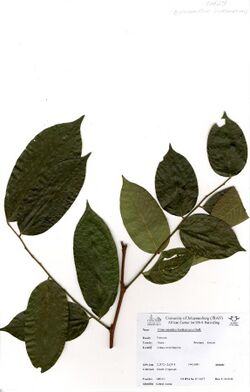Biology:Distemonanthus
| Distemonanthus | |
|---|---|

| |
| Scientific classification | |
| Kingdom: | Plantae |
| Clade: | Tracheophytes |
| Clade: | Angiosperms |
| Clade: | Eudicots |
| Clade: | Rosids |
| Order: | Fabales |
| Family: | Fabaceae |
| Subfamily: | Dialioideae |
| Genus: | Distemonanthus Benth. |
| Species: | D. benthamianus
|
| Binomial name | |
| Distemonanthus benthamianus Baill.
| |
Distemonanthus is a genus of flowering plants in the family Fabaceae. It belongs to the subfamily Dialioideae.[1] It contains a single species, Distemonanthus benthamianus, a deciduous tree,[2] which occurs widely but sparsely in the forest regions of Tropical West and Central Africa; it is sometimes confused with Pericopsis laxiflora due to similar morphological features.[3]
Mature heartwood has a moderate resistance to fungi.
Description
A big tree, it grows up to 40 meters tall and 90 cm in diameter. Trunk is straight but can sometimes be slightly sinuous; fairly spreading buttress roots at the base, free of branches for up to 20 meters. Bark, brown - reddish brown. Leaves, pinnately compound arrangement, 7 - 10 leaflets. Leaf-blade, ovate - elliptical in outline. Fruit, indehiscent pods[3]
Distribution
Tree grows in the high forest of West and Central Africa. Occurs in Gabon, Central African Republic, Nigeria, Ghana, Cameroon. In Gabon, it is known as Movingui.[4]
Uses
Parts of the root is used as a chewing stick for dental hygiene in parts of Nigeria. Bark extracts are used to treat incidents of diarrhea by traditional health practitioners.[5] Used also for decorative veneers and joinery.[4]
References
- ↑ The Legume Phylogeny Working Group (LPWG). (2017). "A new subfamily classification of the Leguminosae based on a taxonomically comprehensive phylogeny". Taxon 66 (1): 44–77. doi:10.12705/661.3.
- ↑ "Distemonanthus benthamianus - Useful Tropical Plants". http://tropical.theferns.info/viewtropical.php?id=Distemonanthus%20benthamianus.
- ↑ 3.0 3.1 Voorhoeve, A. G. (1979). Liberian high forest trees : a systematic botanical study of the 75 most important or frequent high forest trees, with reference to numerous related species (2nd impr ed.). Wageningen: Pudoc. pp. 191. ISBN 90-220-0701-4. OCLC 63303450. https://www.worldcat.org/oclc/63303450.
- ↑ 4.0 4.1 Debout, G. D. G.; Doucet, J.-L.; Hardy, O. J. (2011). "Population history and gene dispersal inferred from spatial genetic structure of a Central African timber tree, Distemonanthus benthamianus (Caesalpinioideae)" (in en). Heredity 106 (1): 88–99. doi:10.1038/hdy.2010.35. PMID 20389306.
- ↑ William, Yousseu Nana; Gilbert, Ateufack; Shah, Abdul Jabbar; Marius, Mbiantcha; Mireille, Tchoumba Tchoumi Liliane; Vanessa, Matah Mba Marthe; Flore, Adjouzem Carine; Gires, Teboukeu Boungo et al. (2019). "Extracts from the trunk bark of Distemonanthus benthamianus Baillon. (Caesalpiniaceae) developed antidiarrhoeal activities in rats and mice" (in en). Oriental Pharmacy and Experimental Medicine 19 (4): 421–433. doi:10.1007/s13596-019-00385-x. ISSN 1598-2386. http://link.springer.com/10.1007/s13596-019-00385-x.
Wikidata ☰ {{{from}}} entry
 |
